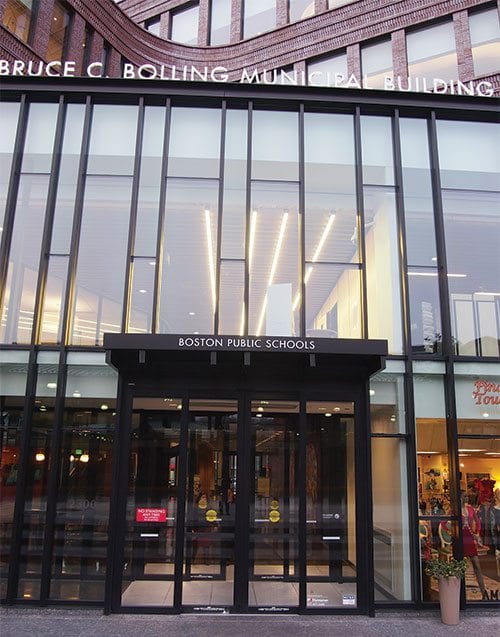
A coalition of civil rights and education groups released a scathing report Wednesday that questioned the city’s commitment to hiring and retaining teachers of color.
Although the city is under a decades-old court order to increase the diversity of its teaching staff, the school department has seen the percentage of black teachers in the system decline over the last ten years. Modest increases in the percentages of Latino and Asian teachers have not offset the losses of black teachers, leading to a slight increase in the percentage of white teachers, according to the report, titled Broken Promises: Teacher Diversity in Boston Public Schools.
The increased proportion of white teachers comes despite the district’s 2016 Opportunity and Achievement Gap Policy, which included goals to recruit and retain “employees at all levels who reflect the demographics of the District’s students.”
Because a large number of BPS teachers of color were hired early in the district’s effort to comply with a 1974 court order to diversify its teaching staff, many black and Latino teachers are now approaching retirement age, a dynamic the report authors say could lead to a further decline in the percentage of black teachers.
“This could create a problem that will last for decades to come,” commented Ivan Espinoza-Madrigal, executive director of the Lawyers’ Committee for Civil Rights.
Espinoza-Madrigal noted that while the composition of the student body in BPS has changed substantially over recent decades, with Latinos now making up the largest group at 42 percent, the city’s hiring practices have remained largely the same.
“We’ve been stagnant and have gone back in some ways,” he said.
Latinos make up 42 percent of BPS students, but just 10 percent of BPS teachers. Blacks are 35 percent of the students, but 20 percent of the teachers — down from 24 percent ten years ago. Asians are 9 percent of BPS students and 6 percent of the teaching staff.
“It’s not acceptable,” Sociedad Latina Executive Director Alexandra Oliver-Davila said of the underrepresentation of teachers of color in the BPS system.
Oliver-Davila, a member of the Greater Boston Latino Network, said students at Sociedad Latina, a Mission Hill-based youth organization, complain about teachers who refuse to call them by their proper names or chastise them for speaking Spanish. She said the absence of Latino teachers could contribute to the achievement gap between Latino and white students.
“If you have someone who comes from a similar background, they would be more comfortable with students speaking a different language,” she said.
A BPS spokesman Dan O’Brien sent the Banner a statement noting a recent increase in hires of teachers of color.
“The spring 2017 hiring season was our most effective on record, yielding 44 percent teachers of color hired to work in BPS this year,” read the statement. ”Over the past several years, BPS has developed and grown numerous initiatives intended to develop, recruit, select and retain teachers of color.”
But NAACP Boston Branch President Tanisha Sullivan said many strategies the district has employed haven’t been implemented. “BPS continues to struggle with the implementation of innovative strategies to increase teacher diversity,” she said in a press statement. “The result being incremental increases among educators of Latino and Asian descent, and a troubling decline of black educators who have been the hardest hit over the past 15 years by the lack of intentionality in the district’s recruitment, selection and retention practices.”
A call for action
The report is signed by the NAACP Boston Branch, the Boston Teacher’s Union, the Black Educators Alliance of Massachusetts, the Boston Network for Black Student Achievement, the Greater Boston Latino Network and the Massachusetts Asian American Educators Association.
It alleges that BPS officials have left solutions to the lack of diversity among its teachers abandoned, unfunded or untried.
“BPS once maintained a staff of three recruiters, which helped to bring the district as close as it has come to complying with its desegregation order,” the report reads. “BPS needs to hire more recruiting staff to conduct outreach and ensure that recruits actually get interviews.”
The district’s so-called pipeline programs, which target BPS students, midcareer professionals, BPS paraprofessionals and substitute teachers, operate below their capacity, according to the report.
“As the number of applicants for these programs well exceeds the number of seats available in them, these programs should be expanded to provide a steadily growing pool of well-prepared teaching candidates,” the report states.
The report also recommends that the central office play a more aggressive role in holding individual schools accountable for hiring more diverse teaching staff. BPS schools select teachers, who are then hired by the district.
“To meaningfully increase teacher diversity, BPS will need to hold each school accountable for continuing diversity gaps,” the report reads. “BPS must also play a more central role in approving hires, as its Office of Equity did in past decades.”
The report also recommends the district take affirmative steps to retain teachers of color, including eliminating bias in the teacher evaluation process, a process the report authors say is subjective.
“When BPS implemented its current teacher evaluation process in 2013, Black and Latino teachers, and older teachers, received disproportionately negative reviews,” the report reads. “The Boston Teachers Union argued that the new process allowed for too much discretion and subjectivity from school administrators, and BPS has publicly stated its commitment to addressing bias in the evaluation system. It must follow through.”
Scrutinizing city hiring
The report is part of an ongoing effort undertaken by civil rights groups to monitor hiring in city departments. Recent reports have found that blacks, Latinos and Asians are underrepresented in city government and are disproportionately concentrated in the lowest-paying city jobs.
“It’s critically important for us to take a look at the racial breakdown of city employees, not just in City Hall, but in the Police Department, Fire Department and in the Public Schools. It’s important for all of our communities to see themselves reflected in our city’s institutions,” Espinoza-Madrigal said.







